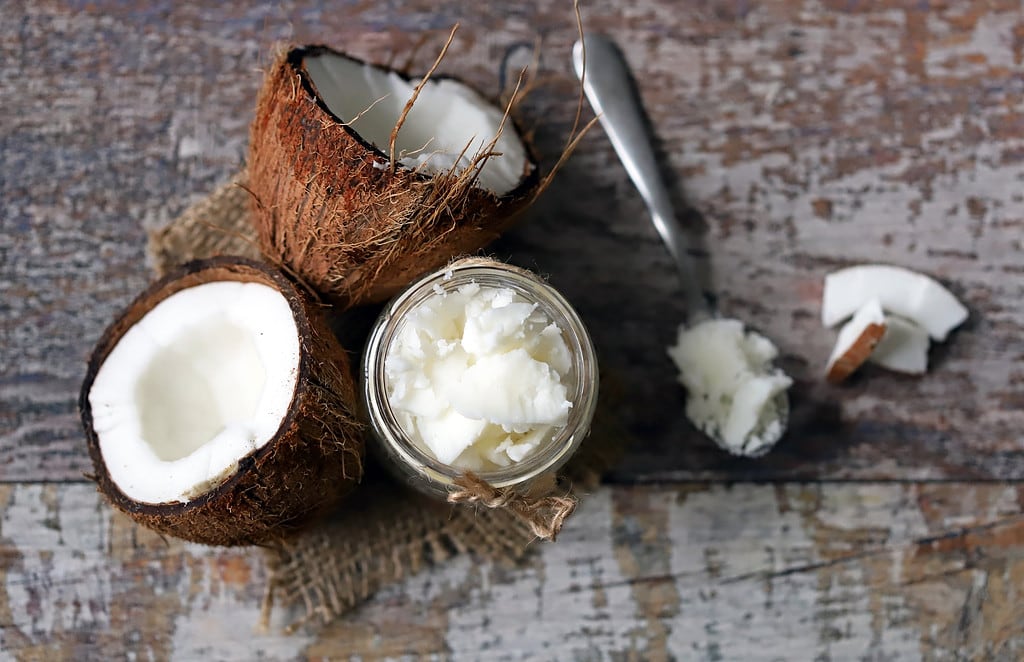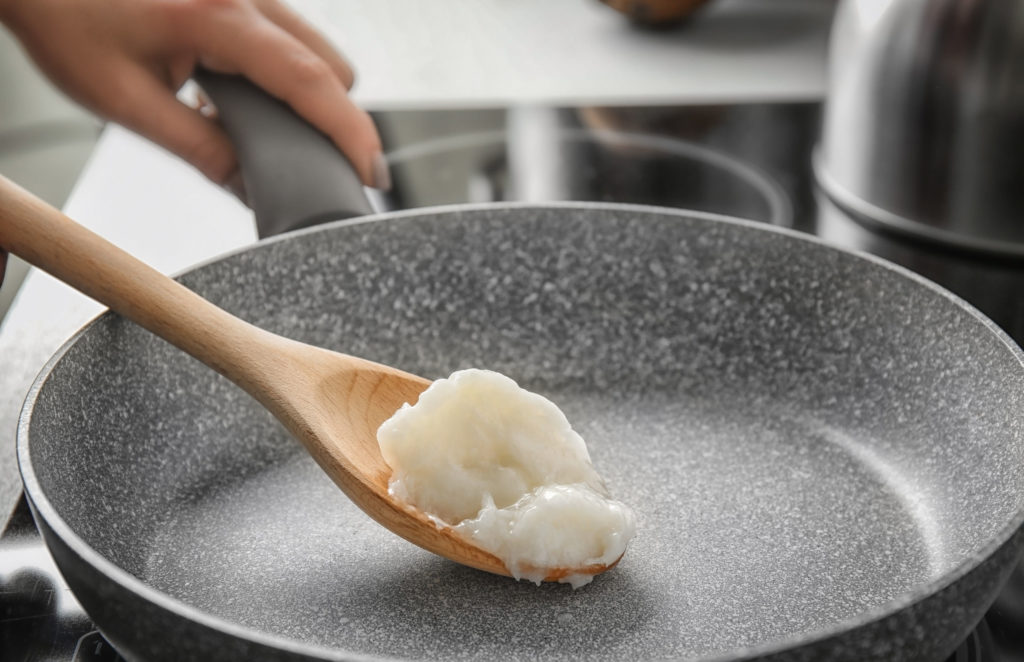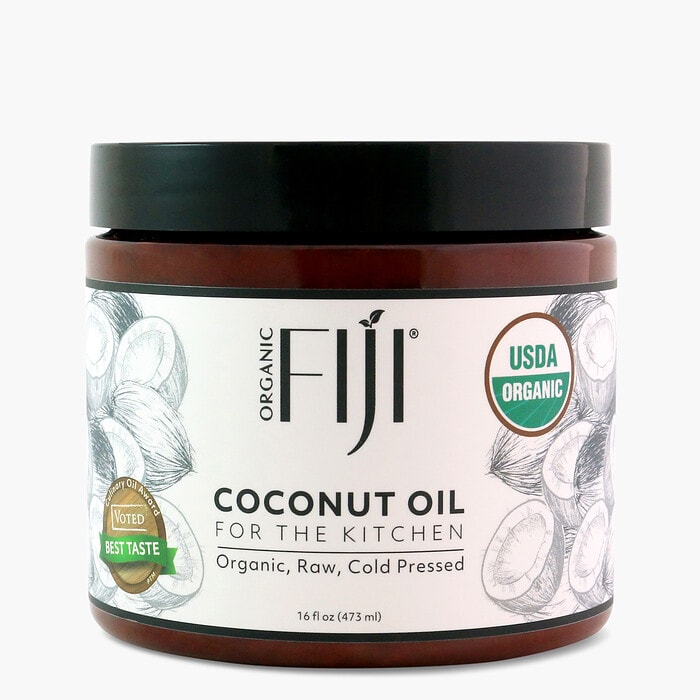Cooking With Coconut Oil
Our Coconut Oil For The Kitchen
Cooking With Coconut Oil By Organic Fiji
Cooking with coconut oil is more than a product choice for your kitchen, it’s an ancient ritual steeped in deep, island history. Organic Fiji’s Culinary Coconut Oil is USDA Certified Organic for the ultimate, clean, island inspired gastronomical experience. Cook, bake, spread, blend and stir with this raw, cold-pressed, vegan coconut oil. It has an award-winning, smooth and nutty taste that is undeniably delicious and is packed full of whole body, superfood benefits too. Cooking with coconut oil will elevate your kitchen creations and connect you with the secret of health and wellness from the South Pacific.
Organic Fiji’s Coconut Oil Standards
Quality matters:
When coconut oil reaches your palette at its highest-integrity, it not only brings you the best taste and the best cooking performance, it also safeguards its unique molecular structure and holistic benefits until it can release them into your body’s ecosystem. Not all coconut oil is created equally, therefore the scope of whole body advantages when cooking with coconut oil decreases as the quality of your oil does. Harness the power of your food, exactly how nature intended.
The journey:
When cooking with coconut oil crafted by Organic Fiji and certified organic by the USDA program means you are not only getting a final product that has been regulated and its claims verified, but you are also supporting the product journey. Ethical practices, traceability and transparency matter – they allow you to vote with your dollar for the type of product and industry you want to experience. Learn more about our unique coconut oil and the special plantation where our coconut oil is born.

A Guide To Cooking With Coconut Oil
Cooking with coconut oil
Cooking with coconut oil will kindle your island spirit and satisfy your taste buds! Use it as a base for curries, to get a stir fry going, to fry up an egg, sear your catch of the day (or portobello mushroom!), to swirl into blueberry oatmeal and so much more!
Baking with coconut oil
Not only can you cook with coconut oil, you can bake with it too! It’s a great alternative to butter for vegans and plant based living. Coconut oil works wonders to grease your baking pan, stir into cake batter, spread over freshly baked banana bread, coat your homemade granola, and so much more! It compliments a variety of tastes in the oven, in particular cinnamon, nutmeg, cardamom, chocolate, caramel, and honey. Who’s hungry?!
Spreading with coconut oil
Cooking with coconut oil is just the beginning! You can also spread coconut oil as an alternative to butter or margarine! Smooth the delicious oil over bread, scones, or even crackers with a little raw honey drizzled over the top. The vegans in your life will thank you!
Stirring with coconut oil
Stir coconut oil into your hot beverages! Ever heard of bulletproof coffee? It’s pure black coffee with a spoonful of raw coconut oil to infuse the drink with a high MCT (medium chain triglyceride) content. Bulletproof coffee promotes ‘ketogenesis” (a metabolic state when your body burns fats in the absence of carbs). It’s designed to replace breakfast, burn fat, increase sustainable energy without the crash, and even bring out the natural oils from your coffee beans! We recommend pairing our culinary coconut oil with Roam Bravely ethical coffee. A match made in heaven!
Caffeine-free? Stirring coconut oil into Golden Milk with turmeric is another super-healer!
Blending with coconut oil
A little scoop of coconut oil before you turn the blender on works wonders to create a whisked and emulsified smoothie with a boost of natural energy.
Popping with coconut oil
Plain and simple, cooking popcorn from scratch using raw, organic coconut oil and a sprinkle of sea salt makes the best sidekick for movies! Healthy, delicious, and gives it a fabulous crunch!
Oil Pulling with coconut oil
Cooking with coconut oil isn’t the only ancient ritual that calls for this ingredient. It is also the perfect oil for oil pulling! Oil pulling is an ancient ayurvedic practice that involves swishing coconut oil around in your mouth for several minutes before spitting it out. This is done to remove bacteria, promote oral hygiene, and according to a 2011 study even treat diseases. As the name suggests, the oil pulls and extracts the toxins that are hiding in your mouth. Raw coconut oil’s antimicrobial properties that are known to fight bacteria give you an extra oral detox too!

The Benefits Of Cooking With Coconut Oil
Although coconut oil has a new wave of popularity in the west, island communities and other tropical areas where coconut trees grow have been using it as far back as records can be traced. Many of these populations have been highlighted in studies that look at cultures with optimal health and wellness (such as the Pukapuka and Tokelau Island studies).
Nutritional fads boom and bust, but coconut is an old-timer that is not going anywhere. Coconut oil’s rise in the west is more of a re-discovery, mainly driven by the dissatisfaction with the grade of other available oils and their soybean / trans fat content. Although a growing knowledge of coconut oil and its potential is decidedly positive, a wide scale consumer-want quickly opened the door for manufacturers – allowing cheap, synthetic and over-processed coconut oils to flood the market and woo consumers with empty promises.
A backlash promptly followed, targeting coconut oil in general, rather than industry standards. If the fats from a coconut were unhealthy, it would be very likely that we would see health problems emerging from the cultures that consume it the most, but we see the opposite. Indiginous island populations are notoriously healthier than western populations, with no trace of heart disease despite their extremely high coconut oil intake. When it comes to cooking with coconut oil, quality reflects results – premium grade, raw, organic coconut oil is known to:
- Contain healthy fatty acids that your body metabolizes differently than other fats – encouraging your body to burn fat more quickly, provide a burst of natural energy, feed brain function and raise HDL (the good cholesterol) in your blood to decrease your risk of heart disease.
- Have antimicrobial properties due to its lauric acid content and monolaurin production – naturally killing harmful pathogens like bacteria and fungi.
- Encourage skin, hair and whole-body benefits from the inside out.
- Have a high MCT content which helps to produce sustainable energy and ketones. Ketones have shown to have positive effects on brain health and are being studied in relation to alzeimers and epilepsy.
- Increase HDL (good cholesterol) and turn LDN (bad cholesterol) into a less harmful formation, boosting heart health and metabolic health.
- Assist weight loss by increasing the number of calories your body burns compared with longer chain fatty acids in other oils.
- Reduce appetite with its naturally rich source of MCTs – producing ketones which can decrease hunger.
- Target stubborn abdominal fat which lodges in the abdominal cavity and around your organs, linked with many chronic diseases. Studies show that coconut oils MCTs can reduce body mass index and waist circumference in both men and women.
- Reduce the symptoms of Alzeimers disease – early studies have suggested that MCTs can provide an alternative energy source for dysfunctional brain cells by increasing blood levels of ketones.
- Decrease the risk of seizures in children by increasing blood density in ketone bodies due to a naturally high MCT structure.
- Decrease the risk of strokes and heart disease alongside a healthier lifestyle.
- Improve the function of other superfood ingredients that are oil soluble and can’t be absorbed efficiently by the body without a molecular structure like coconut oil’s to bond with.
Cooking With Coconut Oil For Heat Stability
When choosing an oil to cook with, it’s important to consider its heat stability too. If an oil oxidizes or goes rancid easily, free radicals could be formed which are harmful to consume. An oil’s resistance to oxidation at any temperature is the amount of saturation of its fatty acid content. Saturated fats have just one bond in the fatty acid molecules, monounsaturated fats have a double bond and polyunsaturated fats have two or more bonds. Fats with multiple bonds are more chemically reactive, therefore sensitive to heat damage. Cooking with coconut oil is your best choice for a temperature stable oil. More than 90% of the fatty acids in a premium grade of raw, organic coconut oil are saturated, making it very stable and resistant to heat. Due to raw coconut oil’s antioxidant levels, it is resilient in inconsistent temperatures and has a shelf-life of 3 years or more without refrigeration.

Advice From The Experts On Cooking With Coconut Oil
Karlene Karst, nutritionist, writer, chef and founder of Verily and Sea-licious, explains “Ok wait a minute…You’ve likely read or heard about the article saying “coconut oil isn’t healthy. It’s never been healthy.” Say…what?!!!! Honestly, nutrition can be so confusing because of the myriad of opinions that exist. When I first started studying fats 20 years ago, it was considered the worst, and that if you consumed coconut oil, heart disease was imminent. Then it redeemed itself…and now coconut oil (and every part of the coconut) is hugely popular and for good reason. The article talks mainly about the dangers of saturated fats, the impact on cholesterol levels and for those of you who have read either my Healthy Fats for Life book or Full Fat Solution book, know I write and speak extensively on saturated fats, and all the myths and misconceptions surrounding them. The bottom line with fats is:
- The ratio of omega6:3 is like 25:1 in North American and it should be 4:1. We get WAY to many omega-6s
One of the biggest risk factors for heart disease (and there are over 200 of them) is inflammation (and many vegetable oils like corn and soybean will increase inflammation more than coconut oil)
LDL particle size and number are really important to give the full picture of cholesterol health
Coconut oil is a saturated fat- but not all saturated fats are created equal (there are short, medium and long chain sat fats) and some are beneficial for us (increase our good HDL cholesterol)
Coconut oil should not be overheated (past 350), nor should any oil. It denatures the healthy fat and causes oxidized free radicals = danger
A balance of fats is important”









